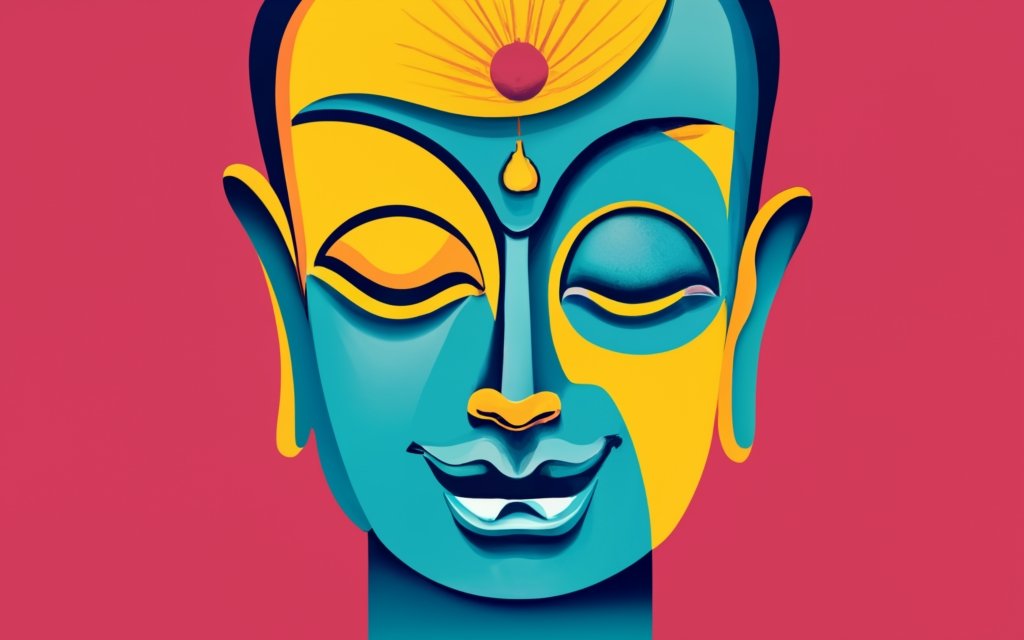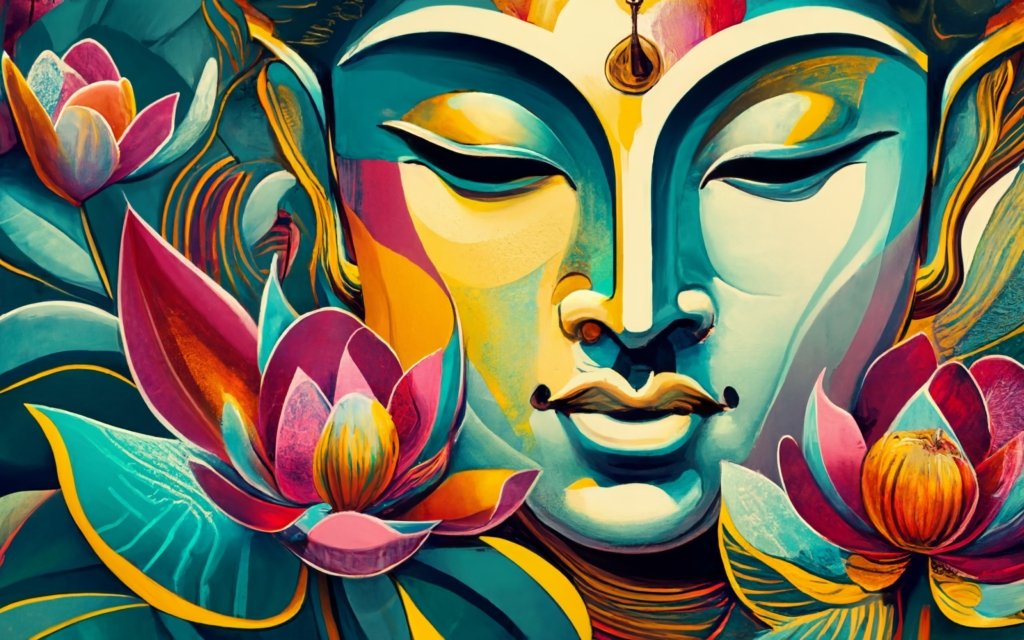Is Buddhism a Religion or Spirituality? Unraveling the Mystery
In the realm of spiritual contemplation, Buddhism stands as a beacon of wisdom, offering profound insights into the human condition. However, a question that often stirs curiosity is whether Buddhism should be classified as a religion or a spiritual philosophy. Let’s delve into this intriguing inquiry, exploring the nuanced dimensions of Buddhism and its place in the world of belief systems.
Buddhism: A Religion or Something More?

Is Buddhism a Religion?
At first glance, Buddhism exhibits characteristics commonly associated with religions. It has a rich history, a set of moral guidelines, and a community of practitioners. However, when we scrutinize Buddhism further, its classification as a conventional religion becomes blurred.
Buddhism lacks some fundamental elements typically found in religions, such as a belief in a divine deity or deities. Instead, it emphasizes the teachings of Siddhartha Gautama, also known as the Buddha, who attained enlightenment through meditation. The absence of a central deity places Buddhism closer to a spiritual philosophy rather than a traditional religion.
The Philosophical Underpinnings
Is Buddhism a Religion or a Philosophy?
To unravel the distinction, we must explore the philosophical aspects of Buddhism. It aligns with a philosophy of life, guiding individuals on a path toward enlightenment and self-realization. The focus is not on worship or ritualistic practices but on inner transformation and the alleviation of suffering.
A Way of Life and a Culture
Is Buddhism a Religion or a Way of Life?
Buddhism is often considered not just a belief system but a way of life. Its teachings extend beyond the spiritual realm, encompassing ethical conduct, mindfulness, and meditation as practical tools for personal growth and well-being.
Buddhism in India and Beyond
Is Buddhism a Religion in India?
Originating in India, Buddhism has had a profound impact on the country’s cultural and spiritual landscape. While it may not conform to the traditional concept of religion, it has certainly left an indelible mark on Indian heritage.
The Peaceful Essence
Is Buddhism a Religion of Peace?
One of the defining attributes of Buddhism is its commitment to peace and non-violence. The teachings of the Buddha emphasize compassion, tolerance, and the cessation of suffering. In this sense, Buddhism serves as a beacon of hope for those seeking a more peaceful world.
Zen Buddhism: A Unique Perspective

Is Zen Buddhism a Religion or Philosophy?
Within the vast tapestry of Buddhist traditions, Zen Buddhism stands out as a distinctive approach to spirituality. It places a strong emphasis on meditation and direct experience. While it encompasses spiritual elements, Zen Buddhism can be perceived as a blend of religion and philosophy, leaning more towards the latter.
“Why Buddhism Is True” – A Modern Exploration

Why Buddhism Is True: A Book Review
In his acclaimed work, “Why Buddhism Is True,” Robert Wright offers a thought-provoking examination of Buddhist principles in the context of modern life. This book provides a fresh perspective on the relevance of Buddhist teachings, inviting readers to explore their own spiritual journey.
Bridging Religion and Spirituality

Differentiating Religion from Spirituality
To answer the question of whether Buddhism is a religion or spirituality, it’s essential to differentiate between the two. Religion often entails organized rituals, institutions, and a prescribed set of beliefs, while spirituality delves into personal experience, self-discovery, and the search for meaning.
Spirituality within Buddhism
Why Buddhism Is True: A Spiritual Journey
Buddhism’s emphasis on spirituality is evident in its core teachings. It invites individuals to embark on a profound spiritual journey, delving into the depths of their consciousness and inner selves. This quest for self-realization and enlightenment is a central aspect of Buddhism’s appeal.
Difference Between Religion and Spirituality
To better understand the spiritual dimension of Buddhism, it’s crucial to distinguish between religion and spirituality. Religion often involves organized rituals, adherence to specific doctrines, and a sense of community. Spirituality, on the other hand, is a deeply personal and experiential aspect of one’s connection with the divine or the universe.
In the case of Buddhism, spirituality takes precedence over religious rituals. It encourages practitioners to explore their inner world through meditation, mindfulness, and self-reflection. This spiritual journey is not bound by strict dogma but rather guided by the teachings of the Buddha.
Spirituality: A Universal Element
Buddhism’s approach to spirituality has a universal appeal. It transcends cultural and religious boundaries, making it accessible to people of various backgrounds. Whether one follows Buddhism as a religion or embraces it as a spiritual philosophy, the underlying principles of compassion, mindfulness, and inner transformation remain relevant.
A Comprehensive Perspective

Is Buddhism a Religion or a Comprehensive Path?
To encapsulate the essence of Buddhism, it’s essential to view it as a comprehensive path encompassing religion, philosophy, and spirituality. It defies rigid categorization, offering a holistic approach to understanding the human experience.
Buddhism’s Influence on Modern Thought

Buddhism’s influence extends beyond its historical origins. In the modern world, it has inspired numerous scholars, thinkers, and individuals seeking a deeper understanding of themselves and their place in the universe. The teachings of Buddhism continue to resonate with those who seek a path to inner peace and enlightenment.
In summary, Buddhism’s classification as a religion or spirituality is not a matter of clear-cut definitions but rather a reflection of its multifaceted nature. It transcends conventional religious boundaries, offering a unique blend of philosophy, way of life, and spiritual guidance. Whether you approach it as a religion, a philosophy, or a path to self-realization, Buddhism’s profound wisdom continues to inspire seekers on their spiritual journey.
Conclusion

In the quest to determine whether Buddhism is a religion or spirituality, we find that it defies easy classification. Instead, Buddhism offers a multifaceted journey that encompasses religion, philosophy, and spirituality. Its teachings guide individuals towards self-realization, inner peace, and a deeper understanding of the human condition.
Whether you approach Buddhism as a religion with a rich history, a philosophy that imparts wisdom, or a spiritual path to self-discovery, its enduring relevance is undeniable. Buddhism remains a source of inspiration and guidance for those who seek clarity, peace, and enlightenment on their unique spiritual journeys.
In the end, the question of whether Buddhism is a religion or spirituality is eclipsed by the profound impact it has on the lives of its practitioners, offering them a path to inner transformation and a deeper connection with the world around them.
Frequently Asked Questions (FAQs) about Buddhism
Is Buddhism Considered a Religion or Spirituality?
Q1: Is Buddhism a religion?
A1: Buddhism, while exhibiting some characteristics of religion, diverges from traditional religious paradigms by lacking a belief in a divine deity. Instead, it emphasizes the teachings of Siddhartha Gautama (the Buddha) and the pursuit of enlightenment. Therefore, it can be viewed as a spiritual philosophy as much as a religion.
Q2: What type of religion is Buddhism?
A2: Buddhism is best described as a non-theistic religion or a spiritual philosophy. It centers on personal transformation and inner awakening rather than worshiping a deity.
Q3: Is Buddhism a religion or philosophy?
A3: Buddhism contains elements of both religion and philosophy. While it imparts philosophical wisdom on life, suffering, and the human condition, it also provides moral and ethical guidance akin to religious teachings.
Q4: Is Buddhism a religion or a way of life?
A4: Buddhism extends beyond religious rituals; it is a way of life that emphasizes ethical conduct, mindfulness, and meditation as tools for personal growth and well-being.
Q5: Is Buddhism a religion or culture?
A5: Buddhism has deeply influenced various cultures, but it is fundamentally a spiritual philosophy with a focus on individual transformation.
Q6: Is Buddhism a religion or belief?
A6: Buddhism involves a belief in the principles of the Buddha’s teachings, such as the Four Noble Truths and the Eightfold Path, rather than belief in a deity.
Q7: Is Buddhism a religion in India?
A7: Buddhism originated in India and has historical and cultural significance in the country. While it may not be the dominant religion in contemporary India, it remains an integral part of its heritage.
Q8: Is Buddhism a religion or a philosophy essay?
A8: Buddhism can be the subject of essays exploring its philosophical and spiritual dimensions, often highlighting its unique blend of both.
Q9: Is Buddhism a religion or practice?
A9: Buddhism encompasses both religious practices, such as meditation and rituals, and a spiritual philosophy focused on individual transformation.
Q10: Is Buddhism a religion of peace?
A10: Yes, Buddhism promotes peace, non-violence, and compassion as core values, making it a religion of peace.
Bridging Religion and Spirituality
Q11: What distinguishes religion from spirituality?
A11: Religion typically involves organized rituals, prescribed beliefs, and community engagement, while spirituality centers on personal experience, self-discovery, and the search for meaning.
“Why Buddhism Is True” – A Modern Exploration
Q12: What is “Why Buddhism Is True” about?
A12: “Why Buddhism Is True” by Robert Wright is a contemporary exploration of Buddhist principles and their relevance in today’s world. It delves into how Buddhist insights can enhance our understanding of human nature and our pursuit of happiness.
Q13: Is “Why Buddhism Is True” worth reading?
A13: Yes, “Why Buddhism Is True” offers a compelling perspective on applying Buddhist wisdom to modern life, making it a valuable read for those seeking personal growth and spiritual insights.
In summary, Buddhism’s classification as a religion or spirituality is a complex and multifaceted issue. It incorporates elements of both, making it a unique and profound system that continues to inspire individuals on their spiritual journeys. Whether one approaches Buddhism as a religion, philosophy, or spiritual path, its teachings provide valuable guidance for personal growth, inner transformation, and a deeper connection with the world.






